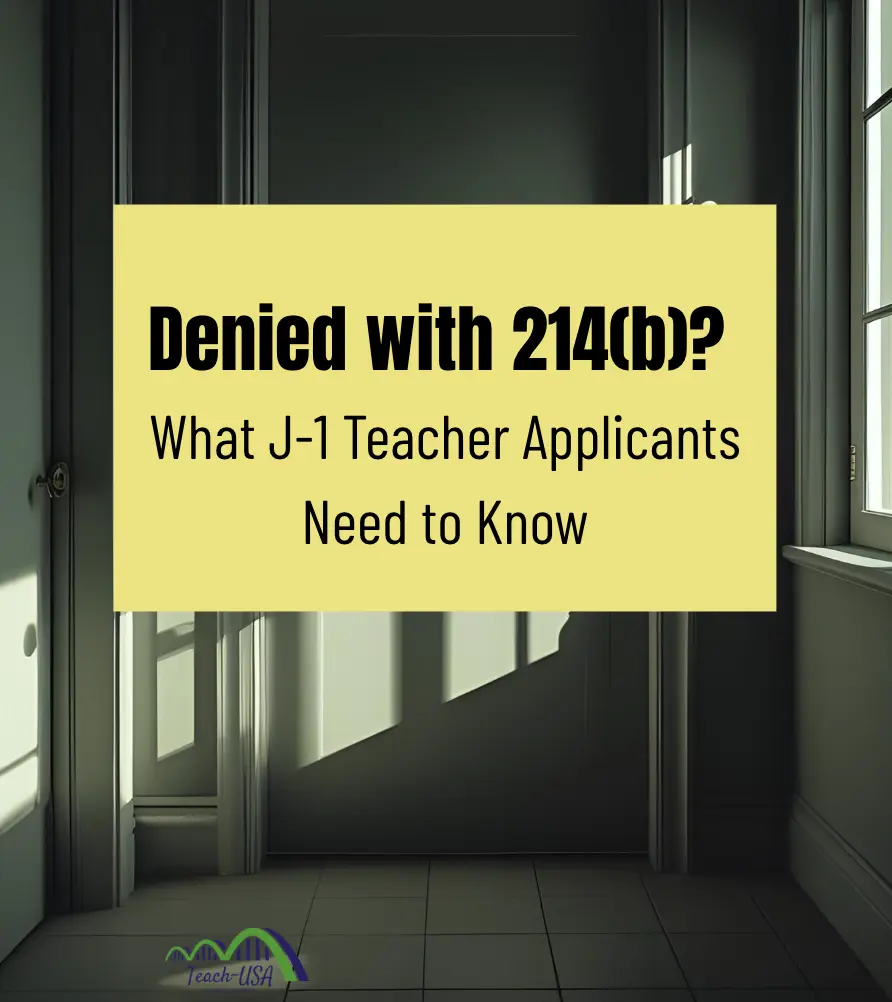So, you were excited to start your teaching journey in the U.S., but then came the surprise:
“Unfortunately, you do not qualify under Section 214(b) of the Immigration and Nationality Act…”
If you’ve received this denial during your J-1 visa interview, you’re not alone. Many qualified and passionate educators face this exact situation—and the worst part is, most are left confused with no clear explanation.
Let’s walk through what a 214(b) denial means for J-1 teacher applicants and how you can bounce back stronger if you plan to reapply.
What Is Section 214(b)—And Why Did I Get Denied?
Section 214(b) means the visa officer wasn’t convinced you will return to your home country after your program. The U.S. government assumes every applicant intends to stay permanently—unless you prove otherwise.
Even if you have a job offer or sponsor, the officer must see that:
✅ You have strong ties to your home country
✅ You are qualified and genuinely intend to teach temporarily
✅ You will return home after the J-1 program ends
Common Reasons Why J-1 Teachers Get Denied
Here are the most frequent—and often misunderstood—reasons for 214(b) denials:
- You couldn’t explain your program clearly.
If you didn’t understand the purpose of the J-1 cultural exchange—or couldn’t explain your U.S. teaching offer—the officer may assume you’re not prepared or serious. - You appeared over-dependent on a sponsor or agency.
It’s great to have support, but you must also show that you personally understand the process, the role of your host school, and your responsibilities. - Your ties to your home country looked weak.
If you’re unemployed, have no dependents, no long-term commitments, or gave vague answers about your life after the program, it raises doubts. - You lacked confidence or gave scripted answers.
If your answers sounded memorized or unsure, the officer may question your intent or authenticity. - They suspect you’ll overstay.
If your background, finances, or travel history suggest you might stay in the U.S. beyond your program, the officer can deny you—sometimes even without asking many questions.
REAL CASE: In a recent 214(b) denial, a J-1 teacher applicant shared that the visa officer only asked these three questions:
❓ Have you ever traveled before?
❓ Are you married?
❓ Do you have a child?
After she answered, she was denied—without being asked anything else.It may seem unfair, but it highlights how quick and subjective interviews can be. You may have excellent qualifications and full documentation—but if your ties to your home country aren’t clearly visible or confidently explained, the officer might not be convinced.
So what can you do if they only ask simple questions?
In visa interviews, you’re not just answering questions—you’re communicating intent. Even if the question seems basic, how you answer can help reinforce your purpose and credibility.
How to Answer Brief Interview Questions (Without Sounding Rehearsed)
✅ What Makes an Answer Strong?
To increase your chances of approval, your answers must:
- ✅ Directly answer the question (don’t dodge or overtalk)
- ✅ Add meaningful context that proves:
- You understand the temporary nature of the J-1 program
- You have strong ties to your home country
- You have a clear plan to return after your program
- ✅ Show maturity, sincerity, and preparedness without sounding scripted
✅ Best Practice: Examples with Strong Framing
❓ “Are you married?”
✅ Best Answer:
“No, I’m not married, but I live with and support my family. I have responsibilities at home and plan to return after my program ends. My long-term goal is to bring back what I’ve learned and grow professionally in my home country.”
Why it works: It directly addresses the question and reinforces your intent to return.
❓ “Do you have a child?”
✅ Best Answer (with child):
“Yes, I have a child who lives with my family and is currently attending school. My J-1 program is a temporary opportunity to grow as a teacher. After that, I plan to return and be fully present for my child and continue my teaching career at home.”
✅ Best Answer (no child):
“No, but I have long-term family responsibilities. My goal is to complete the cultural exchange and return to continue contributing to education in my country.”
❓ “Have you ever traveled before?”
✅ Best Answer (no travel history):
“This will be my first international experience, and I’m excited for the opportunity. I understand that this program is temporary, and I plan to return home once it ends to continue my teaching career and share what I’ve learned.”
✅ Best Answer (with travel history):
“Yes, I’ve traveled before and returned as required. I respect immigration rules and plan to return after completing my J-1 program.”
🚫 What to Avoid
- ❌ Too short: “No.” “Yes.” → Missed opportunity to show your ties.
- ❌ Too long: Overexplaining or sounding defensive may come off as rehearsed.
- ❌ Too vague: “I will return because that’s the rule.” → Instead, show why you personally will return.
Final Tip: Every Answer Is a Window
The officer may not give you many chances, so use each answer wisely to show:
You are a trustworthy, purpose-driven applicant
You understand the program’s limits
You have a life and responsibilities to return to
Can You Reapply After a 214(b) Denial?
Yes—but only if something has changed.
You can’t just reapply and hope for a different result with the same story. The officer will ask:
“What’s different now?”
Here are valid reasons to try again:
- You have a new host school or stronger placement
- You’ve received better training or support documentation
- You now understand your program better and can clearly articulate your role, responsibilities, and cultural goals
- You’ve strengthened your ties (property, job, dependents, school enrollment for kids, etc.)
214(b) Isn’t the End—It’s a Wake-Up Call to Prepare Better
Here’s what you can do differently if you plan to reapply:
✅ Know Your Program
Practice explaining:
- The J-1 is a cultural exchange program for temporary teaching
- You’ll return home after the 3-5 year program ends
- How this experience will benefit your future career back home
✅ Be Clear and Confident
Don’t memorize lines. Understand your answers. Know why you’re going. Be ready for questions like:
- Why did you choose to teach in the U.S.?
- What subjects and grade levels will you handle?
- What will you do after the program ends?
✅ Show Your Ties
Even if you’re excited about the U.S., make sure the officer sees:
- You have family, career, or obligations back home
- You have a reason to return, and you’re not using the visa to immigrate
Sample Interview Answer (If You’re Asked About Going Home)
“Yes, I understand that this is a temporary cultural exchange. After the program, I plan to return to [your country] where I can use my U.S. teaching experience to improve my career and help train other teachers. I’m also committed to my family, and I have long-term plans back home.”
Final Thought: 214(b Is Not Personal. But Your Preparation Should Be.
You might feel discouraged—but a denial doesn’t define your worth as an educator. It simply means you need to tell your story more clearly, more confidently, and more completely.

